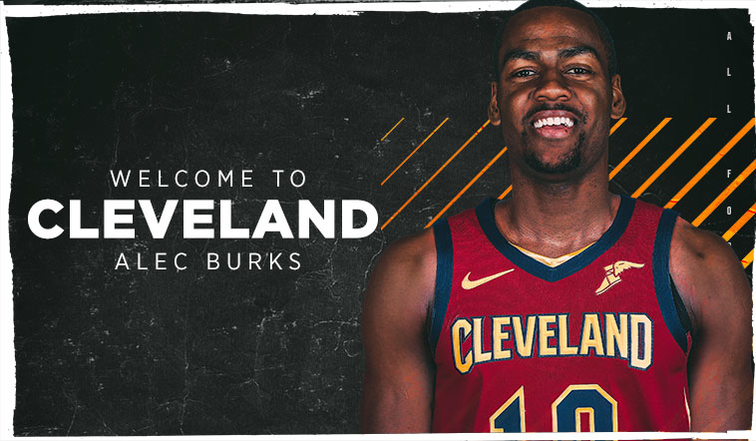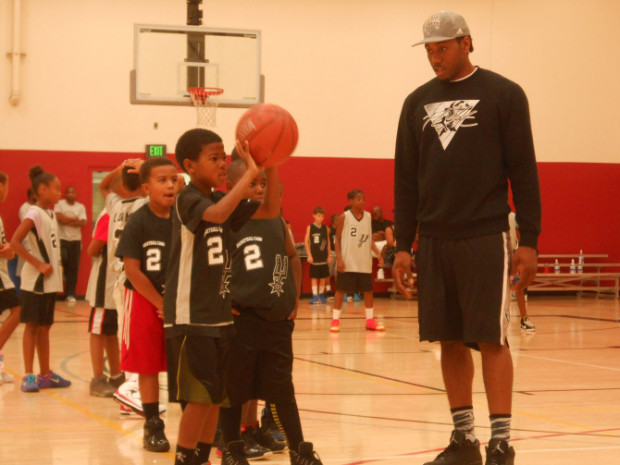
Making Moves
2018-12-02Official!! Cleveland Cavaliers @cavs pic.twitter.com/kIgbhs4wpp
— Jaron Blossomgame (@JaronBgame) December 2, 2018
While not a successful week in terms of wins and losses, the Cleveland Cavaliers have been quite active this week. As we all know, they traded Kyle Korver to the Utah Jazz on Wednesday in exchange for Alec Burks and a pair of second-round draft picks. Then on Sunday, they waived two-way players Andrew Harrison and Billy Preston, while signing Jalen Jones and Jaron Blossomgame to two-way contracts of their own. While none of these additions are going to get much attention, especially during Browns season, each change could have some long-term impact.
Despite the Cavaliers’ struggles, Kyle Korver is still a tremendous loss both on and off the court. On a team that takes far too many mid-range jumpers, Korver’s elite outside shooting often led to their best offense. He also played incredibly smart team defense despite his limitations as a one-on-one defender. Most importantly, Korver was a true professional during his nearly two years in Cleveland, and set the kind of example that any young player should follow.
Still, none of that means that this wasn’t a good trade for the Cavaliers. Korver is 37 years old, and there was no way he was going to net a first-round pick for the Cavaliers H was also too old to be a part of the Cavaliers’ future. He also wanted to play for a playoff team, and despite their early struggles, the Jazz certainly have a good shot of returning to the postseason for the third straight year. This trade makes Korver happy while also netting the Cavaliers some needed assets.
When the Cavaliers acquired Korver from the Atlanta Hawks in January of 2017, they gave up a first-round pick that was top 10 protected in 2019 and 2020. If that pick hadn’t conveyed by then, the Cavs would then owe the Hawks a pair of second-round picks. By acquiring two second round picks from the Jazz, the Cavaliers have been able to essentially offset the cost of Korver. The 2021 pick is especially intriguing as it belongs to the Washington Wizards, a team that could be rebuilding at that point.
Burks is also an interesting asset for a rebuilding team. With an $11.5 million expiring contract, Burks can be used to acquire a longer contract and some sort of asset from a team that wants to create cap space for next summer. Currently, Burks can be traded alone, but once 60 days have passed, his salary can be combined with that of other players in a larger trade. While Burks is certainly a legitimate NBA player, and at 27 is young enough to be a part of the team going forward, his contract currently appears to be a bigger asset than his play. In many ways, Burks is cut from the same cloth as Jordan Clarkson and Rodney Hood. All three players are streaky volume scorers who aren’t very efficient and don’t bring a lot else to the table. Having one of those players can help a team if they are used properly. Having three of those players runs counterproductive to building an efficient offense. Since Burks has the most valuable contract in terms of a trade this season, he’s the most likely to be moved.
https://www.youtube.com/watch?v=5Kyv-DGTqUI
Unlike trading Korver, it was a bit surprising to see the Cavaliers waive Preston and Harrison. A former McDonald’s All-American who was unable to play at Kansas due to an NCAA investigation, Preston is a lanky power forward with good athleticism and a nice shooting stroke. Unfortunately, that’s all he’s shown so far while playing for the Canton Charge. Preston needs to add muscle, and hasn’t been able to score efficiently inside the arc because he is pushed off his spots so easily. He has also struggled on the boards and his passing is unremarkable. Preston has some ability, but he is such a project that it was unlikely that he would be able to help the Cavaliers in the next few seasons.
Harrison hasn’t set the world on fire during his time in Cleveland, but it was still a bit surprising to see him go. With George Hill out, Harrison had been in the rotation as the backup point guard to Collin Sexton. While Hill has returned from injury, it’s widely thought that he could follow Korver out the door at some point this season, due to both his solid play and his small financial guaranteed for next season. It wouldn’t have been a shock to see Harrison get his two-way contract converted to a minimum deal at some point so that he could continue to backup. Still, Harrison has struggled to score from anywhere on the floor during his time with the Cavaliers, and the team has generally tried to fill the rotation with more NBA-level players than they did in 2010, the last time they began to rebuild without LeBron James. The Cavaliers have likely decided that they are better off with another player or simply using Clarkson as the backup point guard if and when Hill is moved.
The Canton Charge acquired Blossomgame from the Austin Spurs on November 19 in exchange for the returning rights of former Cavs two-way player John Holland. A tweener forward out of Clemson, Blossomgame was taken 59th overall by the Spurs in the 2017 NBA Draft. At 24 years old, Blossomgame was more physically developed than most rookies and 16.5 points and 8.1 rebounds for the Austin Spurs on his way to being named Third-Team All-NBA G League and helping the Spurs win the 2018 G League Championship. Blossomgame was invited to training camp with the San Antonio Spurs before this season, but was waived and went back to Austin. His biggest improvement this season has been the addition of a three-point shot, as he is shooting 39.4% from deep on three attempts per game. This season, Blossomgame is averaging 21 points, 7.7 rebounds, 2.4 assists, and 1.1 blocks per game at the G League level. If Blossomgame is going to be successful at the NBA level it will be as a smallball power forward who can defend both positions and space the floor.
Jones was signed as a free agent after spending last season on two-way contracts with the New Orleans Pelicans and Dallas Mavericks after a highly successful run in the G League the season before. A long, rangy small forward, Jones is a versatile (but not lockdown) defender who can guard twos, threes, and fours. He runs the floor well in transition and is a good rebounder for his position. Where Jones struggles is in the halfcourt, where he doesn’t have the ball handling or shooting to make an impact, but isn’t a very active cutter either. If he can improve that activity and at least hit open threes, his defensive versatility could make him a solid perimeter role player. Both Jones and Blossomgame (and Burks for that matter) fit with the type of player Koby Altman seems to have gravitated to, athletic players with good length and solid motors who need to be shaped with good coaching. Whether or not that strategy will work is another matter. With injuries to Sam Dekker, David Nwaba, and Kevin Love, it wouldn’t be a shock to see either player in Cleveland soon.
It’s hard to say what kind of impact these moves will have on the Cavaliers going forward. There’s no guarantee that Burks is dealt for another asset that helps the team, or that he, Blossomgame, or Jones help on the floor. There’s also no guarantee that the second round picks the Cavaliers have acquired from the Jazz have a meaningful impact on their rebuild. What these moves have done is provide the team with more flexibility and options going forward, and that is something every rebuilding team needs.


Jason, you seem to be the only one the moderation settings keep blocking. Not sure what the issue is (can have Nate take a look since he’s more dialed into the site mechanics).
Should be fixed now…
Gettable game tonight.
Wonder if our 2 ways suit up? I hope so.
With an open spot, JR in exile, Love hurt, Nwaba & Dekker out, that is only 10 guys, and two of those are our 3rd/4th string Cs. We basically have 8 guys & no reserve forwards. We should be casting a wide net for players and having an open spot isxa waste. Unless we think we need it for a Hill/JR trade.
MY BAD NOT THE SAME BOLAN —–“OL MAN SYNDROME ” : )
I had the same thought. Was confused. Then figured out Boylen vs Boylan.
CONGRATS TO JIM BOYLEN BEING PROMOTED TO BULLS HEAD COACH—WILL BE INTERESTING WHEN CAVS PLAY BULLS—–DREW AND BOYLEN
Too bad. Had high hopes for Preston, though I knew it was a project.
I hate giving up on guys who then turn out to be players (Danny Green, Joe Harris). Speaking of, winnable game tonight vs Nets. No Joe H or Lavert.
Bulls fired Hoiberg right when Markannen git healtht. They are as badly run as we are.
Jones did shoot around 37% on triples last year in limited time. I posted his stats in the other thread, but it did not go through. Cavs are just hunting for rotational level guys with the two way signings. If a guy develops into a useful end of rotation guy from there it is a win. I would say we have 3 other guts we are hoping to develop to rotation level or better. Nwaba (there in my book), Dekker, and Zizic. We have some youngish guys who are rotational level now, but we are hoping with some development &… Read more »
Hey Jason, I believe Nate has rectified the issue with your comments being moderated. You should be fine now. Will keep an eye on it just in case… Apologies for the inconvenience!
JUST SAW THAT PACKERS FIRED McCARTHY—IS HE / SHOULD HE BE ON THE BROWNS RADAR ?
As a guy who is also a Packers fan, he definitely should be. The amount of disrespect he has been receiving by the fans and media is sad. He’s a great leader and coach and would be perfect for the Browns.
MENTIONED IN THE EARLIER POST ABOUT THE MOVES –( BLOSSOMGAME / JONES )—WE ALL SAW -( ENDURED WHAT HARRISON BROUGHT / DIDN’T BRING TO THE TABLE )–NO SURPRISE OR SADNESS ON HIS BEING CUT—–PRESTON DID SURPRISE –BEING CUT SO EARLY —I HAVE WATCHED MOST OF THE CHARGE GAMES SO FAR THIS YEAR —WAS WAITING FOR PRESTON TO EMERGE / DISPLAY HIS TALENT / ATHLETICISM —-DID NOT SURFACE / IT MAY 3-4 YRS DOWN THE ROAD OR HE MAY BE DESTINED FOR THE EURO / CHINA LEAGUES———AM SOMEWHAT SURPRISED / DISSAPPOINTED THE OTHER CONTRACT WASN’T GIVEN TO BONZI———THINK KOLBY HAS THE… Read more »